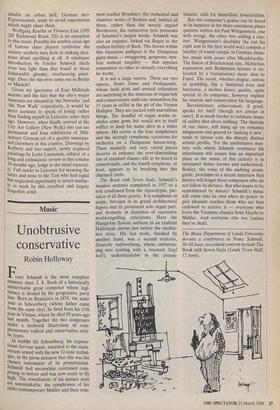Music
Unobtrusive conservative
Robin Holloway
Franz Schmidt is the most complete instance since J. S. Bach of a historically uninevitable great composer whose legi- timacy is denied by the progressive party line. Born in Bratislava in 1874, the same Year as Schoenberg (whose father came from the same city), he lived from his 15th Year in Vienna, where he died 50 years ago last month. Together the two composers make a textbook illustration of com- plementary radical and conservative artis- tic types.
In middle life Schoenberg, his express- ionist fervour spent, returned to the main- stream armed with his new 12-tone techni- que, in the pious delusion that this was the chosen instrument of its perpetuation. Schmidt had meanwhile continued com- posing as before and was now ready to fly high. The constituents of his mature style are unmistakable: the symphonies of his Older contemporary Mahler and their com- mon teacher Bruckner; the orchestral and chamber works of Brahms and, behind all three, rather than the tersely argued Beethoven, the ruminative lyric processes of Schubert's largest works. Schmidt was also an organist, linked via Reger to the endless fertility of Bach. The leaven within this blameless pedigree is the Hungarian gipsy-music — swaggering, gorgeous, opu- lent without turgidity — that appears somewhere or other in virtually everything he wrote.
It is not a large oeuvre. There are two operas, Notre Dame and Fredegundis, whose lurid plots and sensual coloration are surprising in this musician of organ-loft and conservatoire until one remembers his 15 years as cellist in the pit of the Vienna Hofoper. They are packed with marvellous things. The handful of organ works in- cludes some gems but would not in itself suffice to keep his name alive in a wider sphere. His centre is the four symphonies and the strongly symphonic variations for orchestra on a Hungarian hussar-song. These masterly and very varied pieces deserve to enhance the ever-diminishing run of standard classics still to be heard in concert-halls; and the fourth symphony, at least, appears to be breaking into this charmed circle.
The Book with Seven Seals, Schmidt's 'massive oratorio completed in 1937 to a text condensed from the Apocalypse, par- takes of all these genres. It is symphonic in scope, baroque in its grand architectural fugues and its prominent solo organ part, and dramatic in depiction of successive world-engulfing cataclysms. Here the Hungarian flavour surfaces in an exultant Hallelujah chorus just before the medita- tive close. His last work, finished by another hand, was a second oratorio, Deutsche Auferstehung, whose embarras- sing text (ending with a resonant Sieg! heil!), understandable in the circum- stances, calls for immediate resuscitation.
But this composer's genius can be heard at its happiest in the three enormous piano quintets written for Paul Wittgenstein, one with strings, the other two adding a clar- inet. Wittgenstein's disability (he lost his right arm in the first world war) compels a lucidity of sound unique in German charn- ber music with piano after Mendelssohn. The fusion of Brucknerian size, Mahlerian expression and Brahmsian texture is en- livened by a transparency more akin to Faint. The result, whether elegiac, serene or sparkling, has a luminous ease and buoyancy, a molten honey quality, quite special to its composer, however explicit his sources and conservative his language. Revolutionary achievement, if good, speaks for itself (though not always at once). It is much harder to estimate music of calibre that alters nothing. The rhetoric of our times, still hung up on romantic uniqueness and geared to 'making it new', tends to favour only the sharply distinct artistic profile. Yet the unobtrusive mas- tery with which Schmidt continues his inheritance will ensure him an important place as the music of this century is in retrospect better known and understood. Boulez, the voice of the undying avant- garde, proclaims in a recent interview that history will forget those composers who do not follow its dictates. But who wants to be remembered by history! Schmidt's music will come into its own when its power to give pleasure reaches those who are best endowed to receive it — everyone who loves the Viennese classics from Haydn to Mahler. And everyone else too (unless they're deaf).


















































 Previous page
Previous page